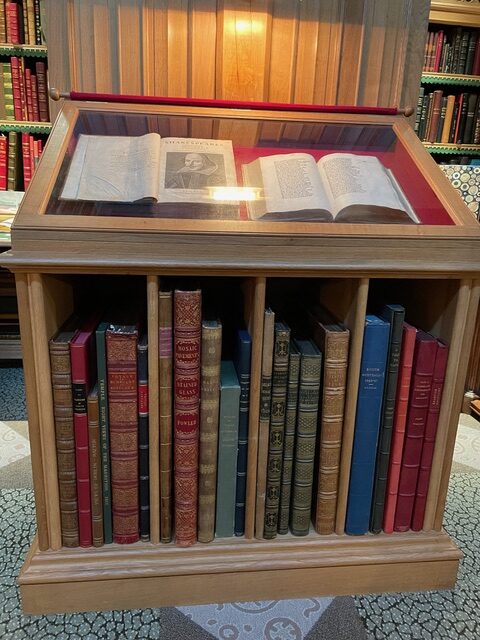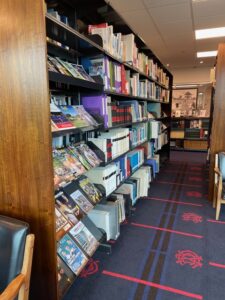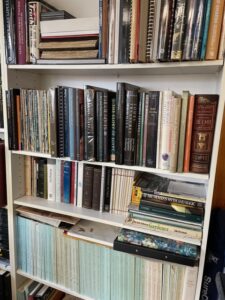Any Questions? Call us at 0419 395 782

When you buy a rare book there is are some simple guidelines that will help you store and handle your books with confidence so you can preserve them for many years to come.
Firstly before you even buy your book I would highly recommend you buy from members of ILAB around the world. Members of ILAB (International League of Antiquarian Booksellers) or the local chapters of ILAB, in Australia that is ANZAAB (Australia and New Zealand Association of Antiquarian Booksellers). Members of these guilds have a high code of service and ethics to antiquarian collectors. They also have years of experience and knowledge in their field to guide and educate their customers. Search out the website to find booksellers who specialise in your interest at www.anzaab.com.au.
Now onto the important objects, the books.
Books are remarkably durable, and while some items of great fragility need a little extra care, most books can be looked after in a domestic environment with no need for climate-controlled vaults or specialist equipment.

Taking the book from the shelf do not pull at the top of the spine (possible tearing of top of spine) but grasp the book in the middle on both sides. If the book is very tightly packed in the shelf (try and avoid this) put your hand into the shelf if possible and pull the book out from the back of the shelf.
The weakest part of a leather-bound book is the joint where the cover opens, so pay particular attention while opening a book. To avoid staraing the joint, pick the book up in one hand and ease it open with the other, supporting the weight of the cover with your fingers.
To open a larger book, keep the book closed while lowering its spine gently onto a flat, clean, forgiving surface. Keep the book upright with one hand, then gently lower the covers one at a time until they both rest flat, all the while keeping hold of the book’s contents. You can then open the pages without danger of breaking the spine or joints.
We do not recommend wearing white gloves to handle books as they reduce tactility and increase the risk of creasing or tearing the leaves (pages). All you need are clean and dry hands.
Books are usually best stored upright on shelves. If you need to lay larger books flat, don’t stack them so high that the books at the bottom are subjected to undue pressure.
Many good booksellers provide transparent polyester covers to protect printed paper dust jackets and other fragile materials. Do not wrap books in ordinary plastic bags, as this can trap moisture and promote mould.
Bookshelves are best situated away from sources of direct heat (e.g. heaters or vents) and air conditioning units. A steady temperature is best, and books generally prefer cooler conditions, ideally 16-19 C. Homes typically tend to be warmer than this and a range of 19-21 C is practical for most people and still an acceptable temperature for books. Relative humidity should be as stable as possible, ideally at 50 per cent – very damp or very dry environments should be avoided.


From reading the above you would note that southern Australia, Melbourne, Adelaide and Tasmania probably are ideal areas to have books but even in those areas it can get very hot at some times of the year, as we all know so its best to try for those temps. For people living in Sydney and Northern Australia your coolest, darkest room would be best. A de-humidifyer could be used in the Summer months and days of high humidity. Desiccated salt packs near the books and changed regularly would be a good idea too.
Vellum is the most unpredictable material commonly used in bookbinding. Rapid changes in temperature and humidity can sometimes cause curvature of the covers (bowing). Resist the temptation of force the covers flat; the bowing will settle in time. If the problem persists, ask your bookseller for an expert who can ease the covers back.
SUNLIGHT– Direct sunlight must be avoided at all costs as it strips the colour from the spines and dust jackets and raises the ambient temperatures. If this can-not be avoided, UV filters can be fitted to windows or bookcases with fitted doors with a UV filter are another solution. Ikea bookcases can be a cheap and ideal solution for your collection here.
WATER – Water damage can be disastrous for books, so any pipes or water sources near bookshelves should be checked regularly. If you live in flood prone areas store your books as high as possible and if flooded move them out as soon as you can.
SMOKE – Books are very good at retaining smells, so wood-burning stoves and fireplaces in the library are not the best idea. Cigarettes, cigars and pipes likewise, also incense burning should be avoided. It might be romantic but its not really good for the books.
FIRE – Properly shelved books are resistant to burning: however their spines can be scorched irreparably by fire. Aside from the usual precautions against household fires, housing books in individual bespoke cases adds an extra layer of protection and should be considered for your most precious of books.
DUST – Store your books on clean shelves and move them occasionally to prevent accumulation of dust. A soft brush can be used to clean top edges, but be careful not to push dirt down between the leaves. Doors on bookshelves also help minimise dust. Another good idea is to make a day every year for book cleaning.
Take the books from the shelves, dust and clean the shelves, dust the books and re-shelve neatly. It is a good time to put books back in the order you like and to add you new purchases for the year into their proper place on your shelves. Pick a special day every year to do this — it is very satisfying and your books will last for many years to come.
INSECTS – There is always the possibility that you will get insects occasionally into the books, silver fish in Australia can be a problem. This is why the yearly cleaning of your shelves will keep insects at bay and also any mould or spoors, dust ect… all enemies of books.

Have a question? Message us, we are here to help you make your collecting experience the best it can be, whether you are an experienced collector, or a passionate reader who has just purchased your first rare book. If you have any questions about your books or how to look after them please get in touch.
This guide was originally authored by Peter Harrington Rare Books, London, I would like to thank them very much for allowing me to reproduce this guide for my own clients. I have added some of my expertise as well, especially Australian conditions which can be particularly harsh as we all know.
Enjoy your collecting experience and I hope you have learnt something from this small guide.
Visit on our Ebay Store.
View our store here.
If you love talking history, drop in and have a chat with Jennifer. Book a time here.
Ankh Antiquarian Books established in 1989, specialises in rare Antiquarian books and new books on the subject of Ancient Egypt and History. Our range of magazines include KMT A modern journal of Ancient Egypt (USA), Egyptian Archaeology Bulletin (the EES UK magazine) and The Nile, an Australian based magazine printed in the UK.

